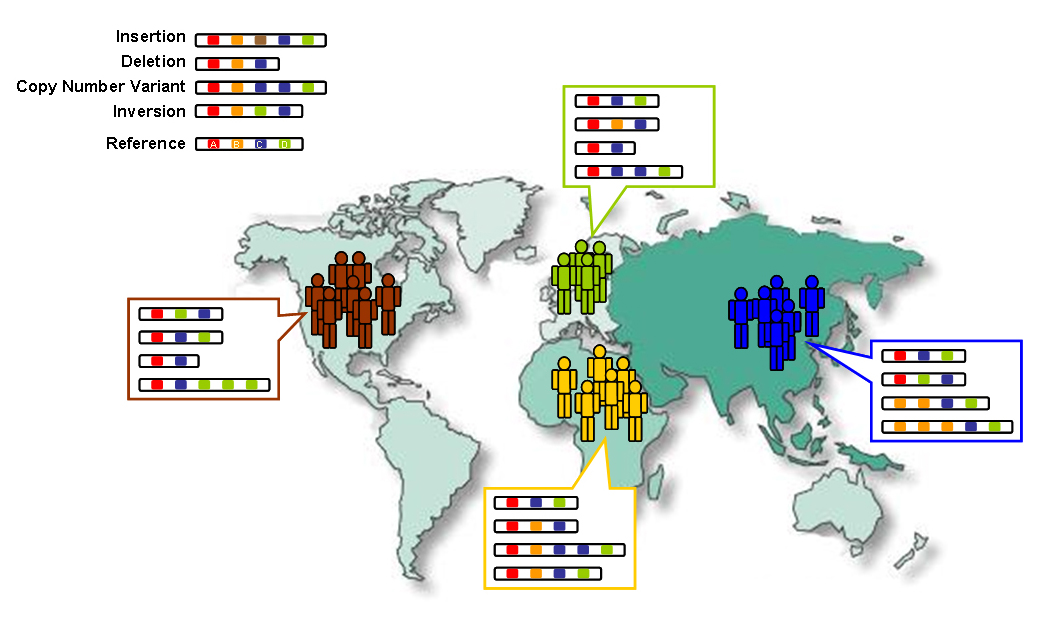1000 Genomes Project
 The 1000 Genomes Project (1KGP), taken place from January 2008 to 2015, was an international research effort to establish the most detailed catalogue of human genetic variation at the time. Scientists planned to sequence the genomes of at least one thousand anonymous healthy participants from a number of different ethnic groups within the following three years, using advancements in newly developed technologies. In 2010, the project finished its pilot phase, which was described in detail in a publication in the journal ''Nature''. In 2012, the sequencing of 1092 genomes was announced in a ''Nature'' publication. In 2015, two papers in ''Nature'' reported results and the completion of the project and opportunities for future research.
The 1000 Genomes Project (1KGP), taken place from January 2008 to 2015, was an international research effort to establish the most detailed catalogue of human genetic variation at the time. Scientists planned to sequence the genomes of at least one thousand anonymous healthy participants from a number of different ethnic groups within the following three years, using advancements in newly developed technologies. In 2010, the project finished its pilot phase, which was described in detail in a publication in the journal ''Nature''. In 2012, the sequencing of 1092 genomes was announced in a ''Nature'' publication. In 2015, two papers in ''Nature'' reported results and the completion of the project and opportunities for future research.Many rare variations, restricted to closely related groups, were identified, and eight structural-variation classes were analyzed.
The project united multidisciplinary research teams from institutes around the world, including China, Italy, Japan, Kenya, Nigeria, Peru, the United Kingdom, and the United States contributing to the sequence dataset and to a refined human genome map freely accessible through public databases to the scientific community and the general public alike.
The International Genome Sample Resource was created to host and expand on the data set after the project's end.
__TOC__ Provided by Wikipedia
-
1
-
2by Ernesto Lowy-Gallego, Susan Fairley, Xiangqun Zheng-Bradley, Magali Ruffier, Laura Clarke, Paul Flicek, The 1000 Genomes Project ConsortiumGet full text
Published 2019-12-01
Article -
3
-
4by The 1000 Genomes Project Consortium, Gabriel, Stacey, Lander, Eric Steven, Banks, Eric, Bhatia, Gaurav, Kashin, Seva, McCarroll, Steven A, Nemesh, James, Poplin, Ryan E., Sabeti, Pardis, Shlyakhter, Ilya, Schaffner, Stephen F, Vitti, Joseph, Hartler, Christina M., Tariyal, Ridhi, Daly, Mark J., Gymrek, Melissa A.Get fulltext
Published 2017
Article -
5by Simon Gravel, Fouad Zakharia, Andres Moreno-Estrada, Jake K Byrnes, Marina Muzzio, Juan L Rodriguez-Flores, Eimear E Kenny, Christopher R Gignoux, Brian K Maples, Wilfried Guiblet, Julie Dutil, Marc Via, Karla Sandoval, Gabriel Bedoya, 1000 Genomes Project, Taras K Oleksyk, Andres Ruiz-Linares, Esteban G Burchard, Juan Carlos Martinez-Cruzado, Carlos D BustamanteGet full text
Published 2013-01-01
Article -
6by Chip Stewart, Deniz Kural, Michael P Strömberg, Jerilyn A Walker, Miriam K Konkel, Adrian M Stütz, Alexander E Urban, Fabian Grubert, Hugo Y K Lam, Wan-Ping Lee, Michele Busby, Amit R Indap, Erik Garrison, Chad Huff, Jinchuan Xing, Michael P Snyder, Lynn B Jorde, Mark A Batzer, Jan O Korbel, Gabor T Marth, 1000 Genomes ProjectGet full text
Published 2011-08-01
Article
